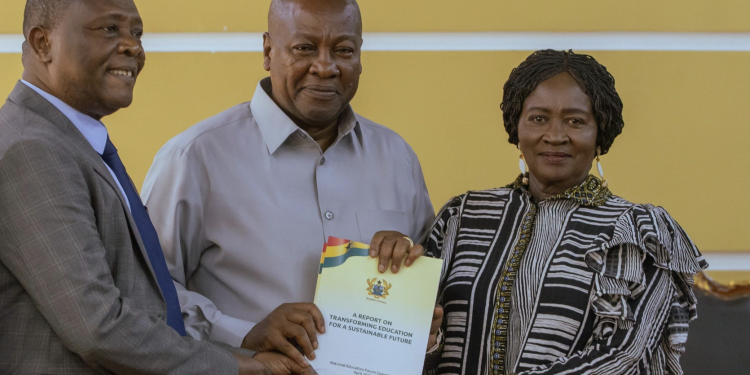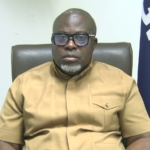
President John Dramani Mahama has received the final report of the National Education Forum from its Chairperson, Professor George Oduro.
The 8-member committee was tasked by President Mahama to consult stakeholders in the educational sector and come up with recommendations to reform Ghana’s educational system.
President Mahama, in his remarks during the presentation of the report at the Presidency in Accra, extended his deepest appreciation to all those who contributed to the National Education Forum, namely teachers, students, researchers, traditional leaders, educational administrators, faith-based organisations, the private sector, and development partners.
He added that the final report was a product of their collective insight, experiences, and unwavering commitment to Ghana’s future.
“Today marks a milestone in our shared effort to reposition Ghana’s education system as a powerful engine for inclusive growth, social justice and national development,” he said.
“Education is the heartbeat of every progressive society. It is not merely the transmission of knowledge; it is the empowerment of young minds, the nurturing of character and the preparation of young people to become responsible citizens and productive members of society.”
He said in a time of global uncertainty, rapid technological development and shifting demographics, Ghanaians need to ask themselves what kind of education system would best serve their people in the 21st century.
“It is that question that inspired the convening of the National Education Forum. Our goal was simple and urgent.
“To build national consensus on how to reform and reimagine education to reflect the needs of our economy, the aspirations of our youth and the values we hold dear as a nation.”
He said the government was determined to make the report a truly inclusive and participatory process, one that would gather voices from every region, every classroom, and every sector of society.
He said the findings and recommendations in the report were both sobering and inspiring, stating that they reveal the depth of the challenges that the nation faces.
These include persistent inequalities in access and quality of education across regions and income levels, and inadequate infrastructure, especially at the basic and pre-primary levels.
Others are learning deficits among children in literacy and numeracy, particularly in rural and underserved communities; a great mismatch between educational curriculum and skills required for the world of work; and weak governance and coordination mechanisms within the education sector.
He said, however, equally, the report not only raises the challenges but also provides a roadmap for how they could move forward boldly and deliberately to address these challenges.
First, the Forum calls for a strong national commitment to foundational learning, because if they fail to get the basic rights – reading, writing, critical thinking, and arithmetic – then no reform they perform at the secondary level or tertiary level would succeed.
“And the evidence is clear. Children who cannot read with understanding by the age of 10 are at a lifelong disadvantage in the education system.”
President Mahama reiterated the need for them to invest in trained teachers, learning materials and supportive home environments to give every child a fair start in life.
He also called for the elevation and transformation of technical and vocational education and training (TVET), which for too long had been treated as a second-tier option.
This, the President said, must end.
“We must build modern, well-resourced TVET institutions across all our regions and districts, aligning them with emerging economic sectors such as agro-processing, green energy, manufacturing, the construction industry and digital services,” he stressed.
He said they would forge strong partnerships with industry to ensure that the training leads to employment or into the world of entrepreneurship.
The report proposes an ambitious and necessary reform, and that was the full rollout of a national apprenticeship programme that was integrated into the formal education and skills development framework.
This, he said, aligns with their broader goal of building a 24-Hour Economy, which depends on skilled labour operating across multiple shifts and sectors.
The President also advocated the need to decentralise teacher recruitment to the district level as part of efforts to ensure efficiency in the educational sector.
On his part, Professor George Oduro, Chairman, National Education Forum, said to improve the effectiveness of using Ghanaian language as a medium of teaching at the foundational education level, the Ministry of Education should facilitate the development of a language policy in education and ensure full integration of Ghanaian language use into all relevant curriculum.
Mr Haruna Iddrisu, the Education Minister, expressed gratitude to the Members of the National Education Forum for assisting President Mahama in honouring one of his campaign promises to Ghanaians.
DISCLAIMER: The Views, Comments, Opinions, Contributions and Statements made by Readers and Contributors on this platform do not necessarily represent the views or policy of Multimedia Group Limited.
DISCLAIMER: The Views, Comments, Opinions, Contributions and Statements made by Readers and Contributors on this platform do not necessarily represent the views or policy of Multimedia Group Limited.
- President Commissions 36.5 Million Dollars Hospital In The Tain District
- You Will Not Go Free For Killing An Hard Working MP – Akufo-Addo To MP’s Killer
- I Will Lead You To Victory – Ato Forson Assures NDC Supporters
Visit Our Social Media for More



